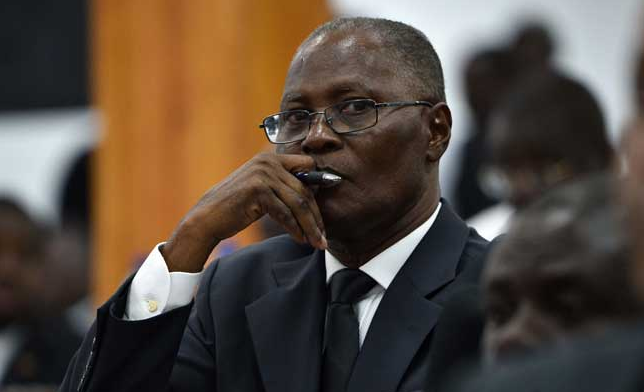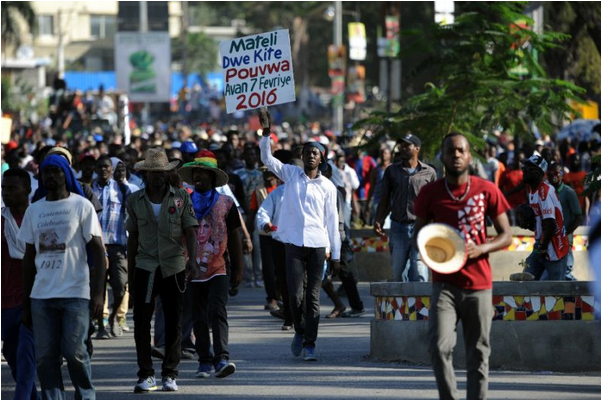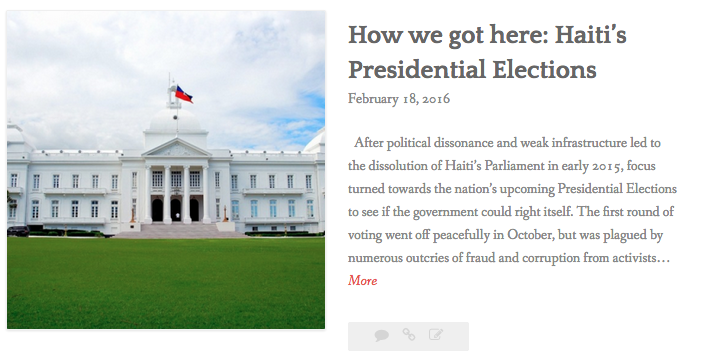For those looking for a refresher, you can find our previous article on Haiti’s 2016 Presidential Election available here.
With this post, we’re picking up with the most recent events, and then going back to Haiti’s foundations to explore the tumultuous path towards Haiti’s current democracy.
Haiti Presidential Election Update:

Jocelerme Privert, at the National Assembly in the Haitian Parliament in Port-au-Prince. (AFP File photo)
After Haiti’s Congress failed to reach a decision to extend his term, President Jocelerme Privert’s interim rule legally expired on Tuesday, June 21, 2016. For the time being he remains in office, despite his opposition’s calls for him to be removed.
A brief history:
During the 17th and 18th centuries, France relied heavily on the trans-atlantic slave trade to sustain the growth and export of crops such as sugar cane, coffee, indigo, cotton, and other spices from their colony of Saint-Domingue (modern day Haiti.) With the huge profits of the cash crop enterprise, reinforced by the profits of France’s brutal slave trade, France’s economy flourished.
As the slave trade fed France’s growing economy (and vice-versa), the population of the French colony of Saint-Domingue grew to just over half a million people by the early 1790’s. Of this half-million, only about 50,000 were free-people, and of these, 30,000 were people of African or mixed Afro-european descent. While socially separated from the white landowners, freed people of mixed descent were allowed to own land and slaves, thereby creating an elite and separate class outside of the small group of French colonists and yet distinct from the enslaved majority.
Following the overthrow of their colonial oppressors, the newly independent Haiti sought out leadership and rule among the elite class of former free planters. This early division created a very small group of politically powerful individuals separated from the larger population of Haitians.
Haiti’s violent beginnings would carry deep into the politics of their newly independent nation. In his book Collapse, Jared Diamond writes; “Out of Haiti’s 22 presidents from 1843 to 1915, 21 were assassinated or driven out of office” (Diamond, 2005.)
To further illustrate this point, the graphic below details each of Haiti’s rulers’ tenure in office, as well as how it ended. To date, only 11 of Haiti’s heads of state have served their full term and then handed power to a successor. The chart below is courtesy of Webster University, but we have completed the data for years 1999-Present.
HEADS OF STATES OF HAITI: PRESIDENTS, KING AND EMPERORS
This Data is Mainly Taken from Lyonel Paquin’s Book,
CLASS AND COLOR POLITICS IN HAITI
Some of the presidents names are hyperlinks to other material on that person often including photos
Prepared by Bob Corbett
| Names | Years | Skin | In Office | Death |
| Dessalines, Jean Jacques | 1804-06 | Black | 2 | assassinated |
| Christophe, Henri | 1807-20 | Black | 13 | suicide |
| Petion, Alexander | 1807-18 | Light | 11 | died in office |
| Boyer, Jean Pierre | 1818-43 | Light | 25 | overthrown |
| Riviere-Herard, Riviere | 1843-44 | Light | 1 | Overthrown |
| Guerrier, Philippe | 1844-45 | Black | 1 | died in office |
| Pierrot, Jean Louis | 1845-46 | Black | 1 | overthrown |
| Riche, Jean Baptiste | 1847-47 | Black | 1 | died in office |
| Soulouque, Faustin | 1847-59 | Black | 12 | overthrown |
| Geffrard, Fabre Nicholas | 1959-67 | Dark | 8 | overthrown |
| Salnave, Sylvain | 1867-69 | Dark | 2 | executed |
| Nissage-Saget | 1870-74 | Light | 4 | full term |
| Domingue, Michel | 1874-76 | Dark | 2 | overthrown |
| Boisrond Canal | 1876-79 | Light | 3 | overthrown |
| Salomon, Lysius Felicite | 1879-88 | Black | 9 | overthrown |
| Legitime, Francois | 1888-89 | Black | 2 | overthrown |
| Hyppolite, Florvil | 1889-96 | Black | 7 | died in office |
| Simon Sam, Tiresias | 1896-02 | Black | 6 | full term |
| Nord Alexis | 1902-08 | Black | 6 | overthrown |
| Simon, Antoine | 1908-11 | Black | 3 | overthrown |
| Leconte, Cincinnatus | 1911-12 | Dark | 1 | died in office |
| Auguste, Tancrede | 1912-13 | Light | 1 | died in office |
| Oreste, Michel | 1913-14 | Dark | 9 months | overthrown |
| Zamor, Oreste | 1914 | Dark | 1 | overthrown |
| Theodore, Davilmar | 1914-15 | Black | 1 | overthrown |
| Sam, Vilbrun | 1915 | Black | 5 months | assassinated |
| Dartiguenave, Sudre | 1915-22 | Light | 7 | full term (During 1st US Occupation) |
| Borno, Louis | 1922-30 | Light | 8 | full term (During 1st US Occupation) |
| Roy, Eugene | 1930 | Dark | 1 | full term (During 1st US Occupation) |
| Vincent, Stenio | 1930-41 | Light | 11 | full term (During 1st US Occupation until 1934) |
| Lescot, Elie | 1941-46 | Dark | 5 | overthrown |
| Estime, Dumarsais | 1946-50 | Black | 4 | overthrown |
| Magloire, Paul | 1950-56 | Black | 6 | overthrown (1957–5 transitory gov.) |
| Fignole, Daniel | 1957 | Black | 1 month | overthrown (1957–5 transitory gov.) |
| Duvalier, Francois | 1957-71 | Black | 14 | died in office |
| Duvalier, Jean-Claude | 1971-86 | Dark | 15 | overthrown |
| Namphy, Henri | 1986-87 | Black | 1 | full term |
| Manigat, Lesli | 1988 | Light | 1 | overthrown |
| Namphy, Henri | 1988-89 | Black | 1 | overthrown |
| Avril, Prosper | 1989-90 | Black | 1 | overthrown |
| Pascal-Trouillot, Etha | 1990-91 | Light | 1 | full term |
| Aristide, Jean-Bertrand | 1991 | Black | 1 | overthrown; in exile 3 of 5 year term. |
| Preval, Rene | 1996 | Black | 1 | still serving as of this writing (March 20, 1999) |
Bob Corbett corbetre@webster.edu
Chart Update Through 2016 (by HaitiHub)
| René Preval | 1996-2001 | full term | |
| Jean-Bertrand Aristide | 2001-04 | overthrown | |
| Boniface Alexandre | 2004-06 | interim president | |
| René Preval | 2006-11 | full term | |
| Michel Martelly | 2011-16 | full Term | |
| Jocelerme Privert | Feb-16 – Present | interim president | |
Haiti’s history of violent activism, social division, and political isolation (subsequently followed by intensive foreign interference) are all contributing factors to the tenuous footing their democracy currently holds.

Anti-Martelly protest earlier this year. Photo Courtesy of AFP (AFP Photo/Hector Retamal)
In more recent decades, frustration with the widespread poverty and the inefficacy of the government’s efforts to improve the living conditions amongst the country’s poorest citizens, as well as unwanted interference from foreign governments, has been cause for political upheaval.
While we wait to see the outcome of the current presidential election, it’s certain that many in Haiti are feeling like they’ve seen this all before.
Written by Erin Nguyen on June 24, 2016


